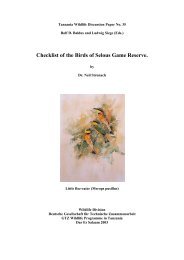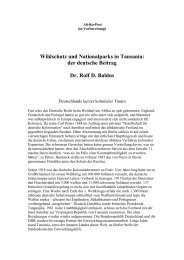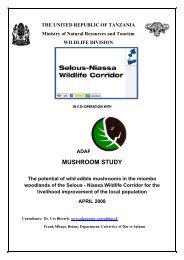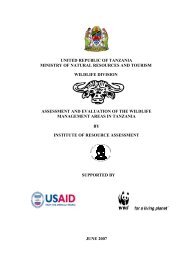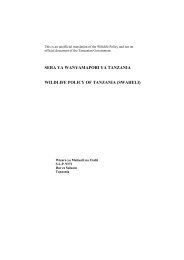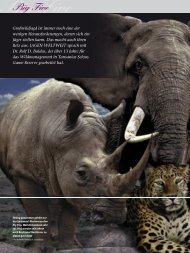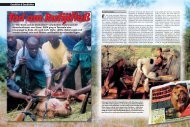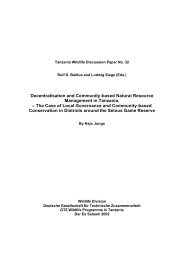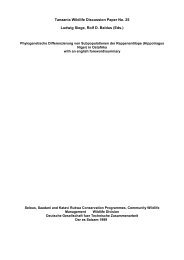African Indaba Articles - wildlife-baldus.com
African Indaba Articles - wildlife-baldus.com
African Indaba Articles - wildlife-baldus.com
You also want an ePaper? Increase the reach of your titles
YUMPU automatically turns print PDFs into web optimized ePapers that Google loves.
Leonard Usongo is enthusiastic about the new developments. "We used to put all our efforts into nationalparks but it was difficult to get much local support,” he says. “This area is too remote for most tourists so theparks don’t do much for the local economy. Now we are trying to conserve the broader landscape. “Thenational parks still exist of course. But now we also work with concessionaires to improve the management oflogging operations and with local people to ensure they can get jobs and also continue to harvest the thingsthey need from the forest.”Jill Bowling, who manages WWF's global Forest Programme, believes the work in southeast Cameroonhas potential in other parts of the world. "If we want our conservation programs to be sustainable in the longtermthen they have to make sense to local people,” she says. “Just setting aside vast areas of forest andclosing them to people cannot work.”WWF’s approach now emphasizes a balance between protecting, managing, and restoring forests —which makes a lot more sense to local partners in poor countries than just protection alone. Diopimb Akandaagrees. “All our traditions and culture are linked to the forest,” he says. “So we care about the forest — butwe also want education, jobs, and health clinics. And if the local economy doesn’t thrive then our children willmove to the cities and only the old people will stay here.” “Thanks to this project, we can find work in theconcessions, we can guide the trophy hunters, and we can still hunt for our own needs," he adds. “We hopein the future that more tourists will <strong>com</strong>e and that we will be able to share with them our knowledge of theforests and our culture.”Jeff Sayer is Forest Conservation Advisor at WWF International - Reproduced with permission from WWF.East <strong>African</strong> Wildlife SocietyFrom the speech of the Chairman of EAWS, Dr. Imre Loefler, at 47th Annual General Meeting held on19 th December 2004The history of conservation and of what I shall call environmentalism can only be understood in thecontext of an emotion laden moral crusade, a pseudo religion with strong anti-development, anti-progress,anti-technology notions. The movement lacked philosophy, lacked organizing principles, often evenrationality and has broken into many sects that bitterly oppose each other. Conservation was pitted againstdevelopment, <strong>wildlife</strong>; even forests were exceptionalized, put outside the mechanisms of economy. By beinga matter of faith rather than thought, by concentrating on individuals rather than species, by putting lawenforcement above all conservation tools, and by being perceived as pro-animal and anti-people,conservation in East Africa has failed. Those who incessantly accuse governments, the <strong>wildlife</strong> authorities,the politicians, the “greed” of people, particularly landowners, should pause and ponder the fact that thevarious environmentalist sects and their churches – the many NGOs – are equally to blame for the decline of<strong>wildlife</strong> and the disappearance of forests.The outstanding contribution of this Society to the conservation in the last few years is the rationality of itsapproach. Central to this philosophy is the recognition that conservation must be incorporated intodevelopment and that unless <strong>wildlife</strong> is husbanded and it creates in<strong>com</strong>e it is doomed.To oppose <strong>wildlife</strong> husbandry in the non-protected areas is paramount to condemn the game there.Hence <strong>wildlife</strong> husbandry should be made legal, sustainable, ecologically and economically rewarding. Somewill take offence at this statement. Indeed the office is receiving numerous correspondence implying that theDirector and the Chairman intend to solicit for the re-introduction of sport hunting. Neither the Director nor theChairman are hunters. Both recognize, however, that in many countries the desire to hunt in perpetuity hassaved species. The Society will continue to debate sport hunting and will continue to monitor the activity inTanzania and in Uganda. In the meantime we shall advise against the re-introduction of sport huntingbecause in an environment that is corrupt, lacks professionalism, lacks concepts and mechanisms ofsupervision, sport hunting is bound to be<strong>com</strong>e exploitative and detrimental to <strong>wildlife</strong>…37



